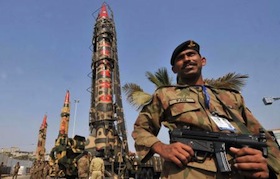Pakistan's Ability to Protect Nuclear Arsenal In Question
Featured Image
Today's top nuclear policy stories, with excerpts in bullet form.
Stories we're following today: Tuesday, June 28, 2011.
Pakistan 'can't protect atomic arsenal from Islamic extremists' - Rob Crilly in The Telegraph [link]
- Professor Pervez Hoodbhoy, who teaches at universities in Lahore and Islamabad, said there was evidence that the Army had been infiltrated by extremist elements.
- "We have reason to worry because the most secure installations, bases, and headquarters of the military have been successfully attacked by Islamic militants who have sympathisers within the military," he said.
- "A frontal assault on nuclear weapons storage facilities, which are the most robustly defended elements of Pakistan's nuclear weapons cycle, is no longer an implausible event," wrote Shaun Gregory, director of the Pakistan Security Unit at the University of Bradford in Britain.
- For more analysis, read the following recent Ploughshares article -- “An Insecure and Reluctant Partner.”
A Policy Victory Offers a Blueprint for Grant Makers and Advocacy - Naila Bolus in The Chronicle of Philanthropy [link]
- In todayʼs bitter and polarized political environment, many nonprofits and grant makers may conclude that it is impossible to get things done … But a major bipartisan victory our foundation and grantees achieved in the Senate is perhaps illustrative of what it takes to succeed, and how grant makers need to think differently about their approach.
- Ploughshares Fund, which has worked for 30 years to reduce the threat of nuclear weapons, saw a critical opportunity to persuade the Senate to approve an agreement known as the New Strategic Arms Reduction Treaty, or New START … Our approach involved three steps any foundation can copy … simply: strategy, network, and leadership.
- Ploughshares Fund flipped our foundationʼs usual practice. Rather than focusing on proposals submitted to us, we identified organizations that could meet particular needs and provided resources to encourage our grantees to focus on tasks at which they already excelled.
Can Disarmament Work? - Bruce Blair, Matt Brown, and Richard Burt in Foreign Affairs [link]
- The Global Zero movement, which we coordinate, calls for the phased and verified elimination of all nuclear weapons worldwide and is spearheaded by more than 300 international leaders, including current and former heads of state, national security officials, and military commanders.
- Our critics, Joffe and Davis included, imply that the movement subscribes to the simplistic "good example" theory of deproliferation, which holds that states will cut their arsenals when inspired by the example of others' doing so. But that characterization of our view is a straw man.
- We argue that it will take a great-power-led coalition of nuclear and nonnuclear countries, fully committed to the elimination of all nuclear weapons, to marshal the political, economic, and military might to halt proliferation worldwide.
Can Disarmament Work? - Josef Joffe and James Davis in Foreign Affairs [link]
- Our basic critique of Global Zero is that you cannot get there from here, and you should not want to.
- The United States and Russia have come down from an insane level of 65,000 warheads to a fraction thereof and will reduce their arsenals even more under the New START treaty. But they will not relinquish weapons that promise existential safety against an existential peril -- and provide a very special status to boot.
- If all of us worry about fragile or aggressive states and their nuclear weapons, why disarm the strong and stable ones? How are you going to deter the acquisition or use of nuclear weapons without them?
- "In a world where nuclear weapons cannot be disinvented, reductions are good, but insurance is best." Now let's argue about how much is enough.
North Korea’s Nuclear Enrichment: Capabilities and Consequences - Olli Heinonen in 38 North [link]
- North Korea’s pursuit of uranium enrichment should not, and has not, come as a surprise.
- In engaging North Korea, several key hurdles have to be tackled. First, North Korea shows a poor proliferation record...Second, North Korea has demonstrated its capability and intent to further develop the full range of its nuclear arsenal..
- Given the current nuclear situation in North Korea, a different approach [for engagement] would be needed if we want to progress substantially and significantly on properly safeguarding North Korea’s nuclear program. A full disclosure of the country’s historical and current nuclear activities will be necessary under any new agreement negotiated, alongside robust inspection rights for the IAEA.
Heritage Foundation Fails Test on another Treaty - Kingston Reif and Dadie Loh in The Center for Arms Control and Non-Proliferation [link]
- Uncowed by its failure to convince the U.S. Senate and the American public to oppose the New START treaty, the Heritage Foundation is trying to gin up opposition to another international treaty that would greatly benefit U.S. national security: the Comprehensive Test Ban Treaty (CTBT).
- Because the U.S. does not conduct nuclear tests and has no plans or the need to do so, it should take advantage of the security and political benefits that would come with ratification of the CTBT. A permanent test ban would close off the one reliable avenue - nuclear testing - by which other states might develop new, sophisticated weapons and/or increase the lethality of already existing arsenals.
- ... the Heritage Foundation has published numerous articles attacking the treaty … [which] reprise the same arguments against the treaty that were deployed by opponents in 1999. Although these arguments have been discredited over and over again, the Heritage Foundation keeps making them.



